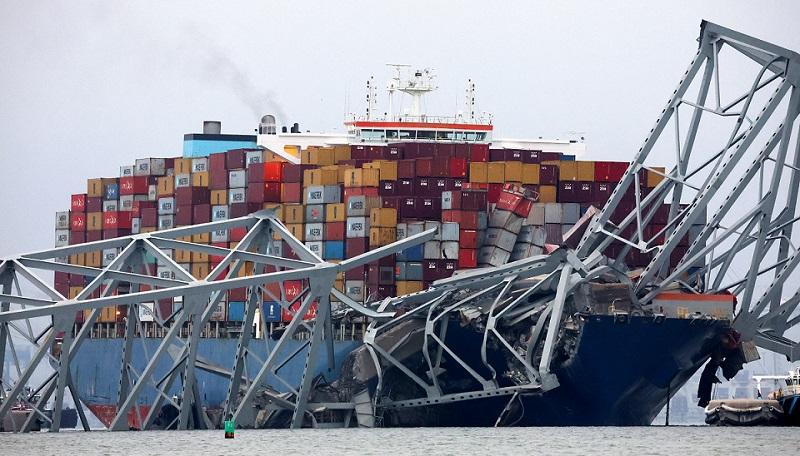Two bodies found as Baltimore bridge collapse moves from recovery to salvage

The bodies of two construction workers were found in the cold waters of Baltimore harbor Wednesday, trapped in their red pick-up truck after a giant cargo ship slammed into the bridge they had been filling potholes on, causing a thunderous collapse.
Maryland police announced the grim discovery at a press conference, adding that sonar shows what they believe are more vehicles trapped within the concrete and twisted steel debris of the Francis Scott Key Bridge.
Six of the eight-man construction crew are believed to have been killed, with four bodies yet to be found.
Warning that it was not safe for divers to try to penetrate the wreckage, police told a press conference that they were shifting to a salvage operation, removing the superstructure and then sending divers back in to recover the rest of the bodies.
"Based on sonar scans, we firmly believe that the vehicles are encased in the superstructure and concrete that we tragically saw come down," Colonel Roland Butler, the superintendent of Maryland's state police, told a press conference.
The container ship Dali, about 1,000 feet (300 meters) long, and piled high with cargo, was leaving the busy port at 1:30 am Tuesday en route to Asia when power failed and the vessel crashed straight into a support column.
Nearly the entire steel structure -- crossed by tens of thousands of motorists each day -- collapsed within seconds, cascading over the bow of the ship, blocking one of the busiest US trading ports.
The ship issued a Mayday call in the moments before the collision, prompting police to rush to stop traffic on the bridge -- likely saving lives.
But there was no chance to evacuate the eight workers filling potholes on the road directly above the oncoming ship.
Butler named the two victims found Wednesday as Alejandro Hernandez Fuentes, a 35-year-old who had lived in Baltimore but was originally from Mexico, and his 26-year-old colleague Dorlian Ronial Castillo Cabrera, who lived in the suburb of Dundalk but came from Guatemala.
They were found in 25 feet of water, he said.
Two others were pulled from the water alive in the moments after the collapse early Tuesday. One was uninjured, while the second was released from hospital Wednesday, Butler said.
Four more workers are presumed dead, vanished into the swirling currents and crumpled tangle of wrecked girders and pylons.
'Hard-working' men
The vessel, which remained entangled in the debris Wednesday, was "stable," Coast Guard Vice Admiral Peter Gautier told reporters at the White House, adding that the mostly Indian crew remained on board and were "very much engaged" in the investigation.
The National Transportation Safety Board, a federal authority, said that the ship's data record, or black box, had been recovered so that investigators can understand what went wrong.
Gautier insisted the ship did not present an environmental danger, despite the billion and a half gallons of oil and few dozen hazardous material cargo containers on board. Two other containers -- of the total 4,700 -- were lost overboard, he said.
Officials said the missing workers were from El Salvador, Guatemala, Honduras and Mexico.
"They are all hard-working, humble men," said Jesus Campos, a colleague of the eight workers, all employed by contractor Brawner Builders.
One of those now presumed dead was father-of-three Miguel Luna, according to the nonprofit Casa, which serves immigrant communities.
Luna, from El Salvador, had left for work at 6:30 pm on Monday and never returned, Casa said.
His wife, Maria del Carmen Castellon, told Telemundo 44 that she was "devastated" by the wait for any information.
"My heart hurts with this situation," said Campos.
Busy harbor blocked
Footage of the collision showed the vessel slamming into one of the 47-year-old bridge's supports.
The ship had passed two overseas inspections in 2023, the maritime authority for Singapore, where the ship is flagged, said Wednesday, adding that a fault monitor gauge was fixed in June.
The Port of Baltimore is the ninth-busiest major US port in terms of both foreign cargo handled and foreign cargo value, and is directly responsible for more than 15,000 jobs, supporting almost 140,000 more.
The effect on supply chains "clearly will not be trivial," US Transport Secretary Pete Buttigieg said, adding it was "too soon" to know when the port might reopen.
"Rebuilding will not be quick, or easy, or cheap," he cautioned. — Agence France-Presse

Need a wellness break? Sign up for The Boost!
Stay up-to-date with the latest health and wellness reads.
Please enter a valid email address
Your email is safe with us






